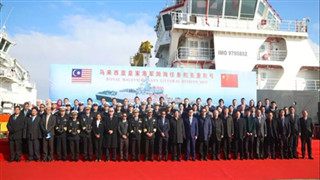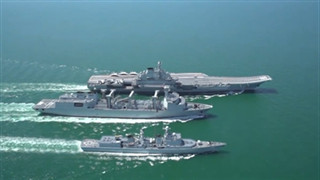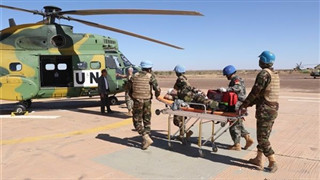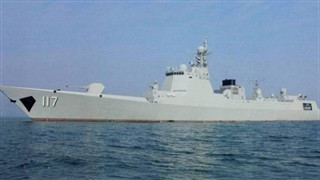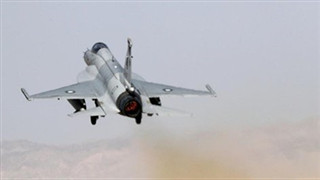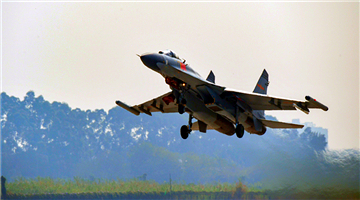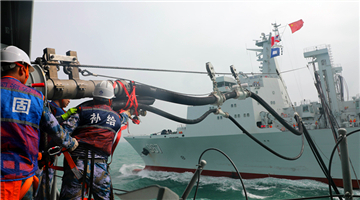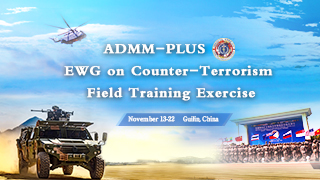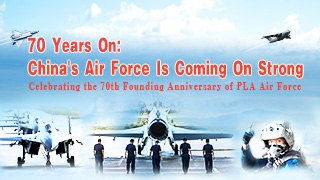
By Zhou Feihu
As a doctor, I’ve seen so many deaths that I’ve become accustomed to it, but when I went to Liberia as a member of the Chinese contingent to fight Ebola in January 2015, I felt pressured and challenged as never before.
Before we set out, I’d already heard a lot about the dangerous Ebola outbreak in Africa, but I was still shocked by the tense atmosphere when we arrived in Liberia. Vehicles and equipment marked with “UN relief” were everywhere, military transport planes came and went frequently, and everyone coming in and out of the airport had to have their temperature tested...
January in Liberia was the dry season with the average temperature of 40 Celsius degrees, and the sanitary conditions were unbelievably poor with mosquitoes and flies swarming here and there. What was worse, nearly half of the 200-plus qualified local medical personnel had died from Ebola infection, paralyzing the normal medical relief work.
My comrades and I completed the equipment commissioning as soon as possible and threw ourselves into work immediately. The Ebola vaccine hadn’t be invented yet, so we had to enter the wards wearing three layers of special costumes in the high temperature.
The infected area was our battlefield. As Ebola could be spread through body fluids, every time we walked out of the ward, what we were most concerned about was how to take off the outfit that had been contaminated with the virus and the sweat-soaked underwear hygienically.
I was often asked a question: weren’t you afraid? I’d be lying if I said no. I’m a soldier and doctor, and treating patients was my top priority.
In the next two months and more, I participated in the treatment of 61 patients and received 38 ones suspected of Ebola infection, among whom five being confirmed.
One year after I completed the mission in Liberia, I was assigned on another peacekeeping mission to Mali, the most dangerous mission area in Africa.
In May 2016, the 4th Chinese peacekeeping force to Mali was attacked, which killed peacekeeper Shen Liangliang and injured many others. Soon afterwards, I, along with three other comrades in the medical team, was assigned to Mali to take the injured peacekeepers home.
After arriving in the war-ravaged Mali of West Africa, I found the mission was unexpectedly arduous and formidable. Several Chinese peacekeepers got wounded with detonation, which left serious internal damages other than the obvious bone fractures and external wounds.
The medical conditions in Mali were too poor, so the injured soldiers were quickly transferred to more standard hospitals in Senegal after primary treatment, and I had to stay there alone to take care of them because of staff shortages.
But unexpected trouble emerged one after another. There was so few equipment at the hospital that we didn’t even have enough breathing machines and monitors when there were too many severe cases. I had to rely on the stethoscope and my clinical experience in terms of diagnosis and treatment. I stayed with the patients for more than 20 days, helped them get through the critical period and transfer from ICU to regular wards.
After the injured Chinese peacekeepers became stable in physical conditions, I was assigned to take them back to China by regular passenger flight and we had to transfer once on the way. The trip lasted about 30 hours without any oxygen gear or monitor, and the wounded might have thrombus or even worse situations if they stayed still for too long.
Under pressure, I made detailed plans and didn’t sleep a wink on the plane. I closely watched the conditions of the wounded, and helped them move their limbs in case of any emergency.
When the plane landed and I saw the crowds with flowers in hand waiting to welcome our heroes, a sigh of relief was belatedly breathed. We made it homesafe.
The author is director of ICU at the First Medical Center of Chinese PLA General Hospital.
(This article is interviewed and organized by PLA Daily’s special correspondent Luo Guojin, reporter Cheng An’qi and correspondent Hong Jianguo)
